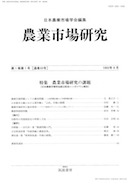23 巻, 3 号
選択された号の論文の9件中1~9を表示しています
- |<
- <
- 1
- >
- >|
シンポジウム報告
-
原稿種別: 座長解題
2014 年 23 巻 3 号 p. 1-4
発行日: 2014/12/31
公開日: 2020/06/22
PDF形式でダウンロード (524K) -
原稿種別: 論文
2014 年 23 巻 3 号 p. 5-15
発行日: 2014/12/31
公開日: 2020/06/22
PDF形式でダウンロード (1211K) -
原稿種別: シンポジウム報告
2014 年 23 巻 3 号 p. 16-25
発行日: 2014/12/31
公開日: 2020/06/22
PDF形式でダウンロード (1317K) -
原稿種別: 論文
2014 年 23 巻 3 号 p. 26-35
発行日: 2014/12/31
公開日: 2020/06/22
PDF形式でダウンロード (1278K) -
原稿種別: コメント
2014 年 23 巻 3 号 p. 36-37
発行日: 2014/12/31
公開日: 2020/06/22
PDF形式でダウンロード (217K) -
原稿種別: コメント
2014 年 23 巻 3 号 p. 38-39
発行日: 2014/12/31
公開日: 2020/06/22
PDF形式でダウンロード (288K)
論文
-
原稿種別: 論文
2014 年 23 巻 3 号 p. 53-59
発行日: 2014/12/31
公開日: 2020/06/22
PDF形式でダウンロード (841K) -
原稿種別: 論文
2014 年 23 巻 3 号 p. 60-65
発行日: 2014/12/31
公開日: 2020/06/22
PDF形式でダウンロード (736K) -
原稿種別: 論文
2014 年 23 巻 3 号 p. 66-72
発行日: 2014/12/31
公開日: 2020/06/22
PDF形式でダウンロード (828K)
- |<
- <
- 1
- >
- >|
